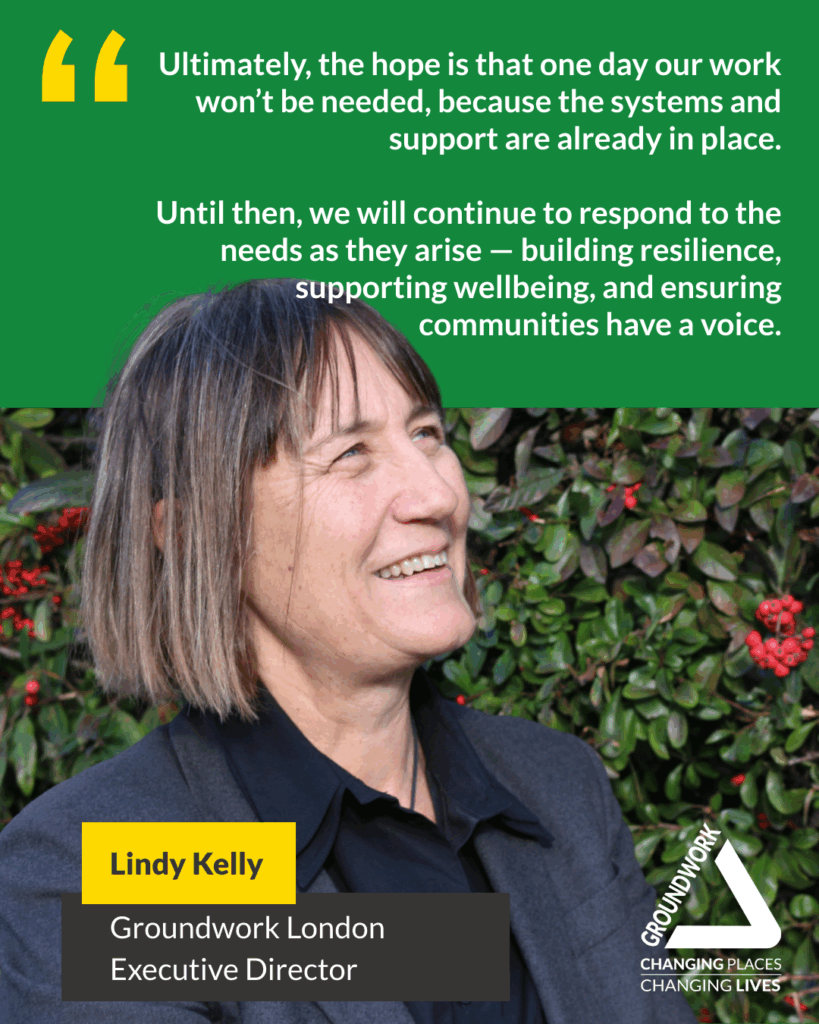Building a greener and fairer future: Groundwork then and now. An interview with Lindy Kelly
From Bold Experiment to Lasting Impact
Groundwork began as a bold, practical experiment in the early 1980s — a time when large parts of Britain were struggling with industrial decline, rising unemployment and neglected neighbourhoods. The movement was established to bring communities, businesses, and local government together to tackle environmental degradation and social inequality at the same time, using hands-on projects to improve places and people’s prospects.
From its earliest days, Groundwork operated through a federation model — independent local trusts working to meet the needs of their communities, while being supported by national programmes and shared expertise. This model ensured projects were rooted in local priorities yet connected to a wider mission, creating a strong foundation for long-term change.
The social and economic backdrop of the time was stark. Once a thriving area for manufacturing, since the 70s mills and factories were closing, unemployment was at record highs, and many estates – called ‘sink estates’ were left neglected.
What Lindy Kelly, now Executive Director of Groundwork London, witnessed when visiting her first Groundwork project left a mark:
An estate built in the late 1960s, in very poor condition. No parks, no play, housing in disrepair. In the middle of it, one Groundwork project officer with a trailer and 40 young people, working together to transform a patch of land into a wild conservation area. It was freezing, the kids had no shoes, but there was so much energy.
That vision — empowering communities to make change for themselves — became the start of Lindy’s decades-long journey with Groundwork.
Challenges That Have Evolved—but Not Disappeared
While Britain’s industrial landscape has shifted, the challenges of inequality, environmental degradation, and community resilience remain pressing. In London, around one in four children still live in poverty after housing costs.
Deprived communities continue to face reduced access to green space, with some areas having 50% less tree canopy and parkland compared to wealthier parts of the city.
Environmental pressures have intensified. Climate change, largely absent from the public agenda in the 1980s, now shapes daily life in the capital. Heatwaves, flooding, and poor air quality disproportionately affect the most vulnerable, particularly in areas with dense housing and minimal green infrastructure.
In 2025, England experienced its warmest June ever during four heat events in summer 2024, England recorded 1,311 heat-associated deaths, which is 282 more than historically expected.
The Power of an Integrated Approach
Groundwork’s approach continues to tackle environmental and social issues side by side. Projects range from restoring parks and creating rain gardens to planting trees and building green corridors. These physical improvements are paired with programmes that train residents in green skills, support entry into environmental jobs, and create volunteering opportunities that foster pride and ownership.
This integration means that every intervention addresses multiple challenges: a revitalised park can improve air quality, provide shade in summer, encourage biodiversity, and act as a hub for community activity — while also offering pathways to training and employment.
Lindy’s own journey reflects this blend of environment and people. In the late 80s, first as a volunteer and then as a project officer, she planted trees, helped with landscape maintenance, built footpaths and rescued frogs. Later, while she worked as a manager and fundraiser, Groundwork Manchester grew from a team of 8 to 44 in under a year.
“Although the environment has always been my passion,” she explains, “ visiting Sholver Estate in 1985 made me realise I want to work with people first, and use the environment and nature as a catalyst for change. It brings people together, it creates opportunity, it opens doors.”
This philosophy remains central to Groundwork London today: every project is an opportunity to improve both place and prospects.
Creating Visible and Lasting Change

In recent years, Groundwork London has supported numerous of residents into green-sector employment, transformed neglected plots into thriving community spaces, and installed nature-based solutions to manage stormwater and reduce urban overheating.
Each project is designed not just to meet immediate needs, but to create long-term environmental and social value.
By working in partnership with local authorities, housing providers, businesses and communities, Groundwork demonstrates how change can happen at scale — and why partnership is central to its success.
“Triangles are difficult to break. Partnership is a strong model.”
A Collective Mission for a Resilient Future
The challenges facing London — from persistent poverty to the climate emergency — demand solutions that are collaborative, practical, and rooted in local realities. Groundwork’s forty-plus years of experience show that when communities are given the tools, skills, and confidence to shape their own environments, lasting transformation follows.
The vision is clear: a city where every neighbourhood has access to nature, where the benefits of the green economy are shared fairly, and where environmental improvements are catalysts for social change. Through collective practical action and sustained support, this vision is within reach.
Groundwork should be a great place to work and make a lasting difference to the communities we serve. Ultimately, the hope is that one day our work won’t be needed, because the systems and support are already in place. Until then, we will continue to respond to the needs as they arise — building resilience, supporting wellbeing, and ensuring communities have a voice.
The challenges may have evolved since that cold November day in 1985, but the principle remains the same: through collective action, communities can create greener, fairer places and bring the change they need for themselves.
To work with us, contact us at london@groundwork.org.uk or visit our ‘What we dot’ section and contact our department leads.
